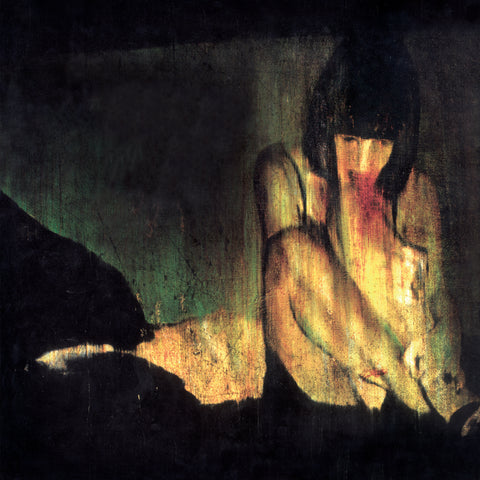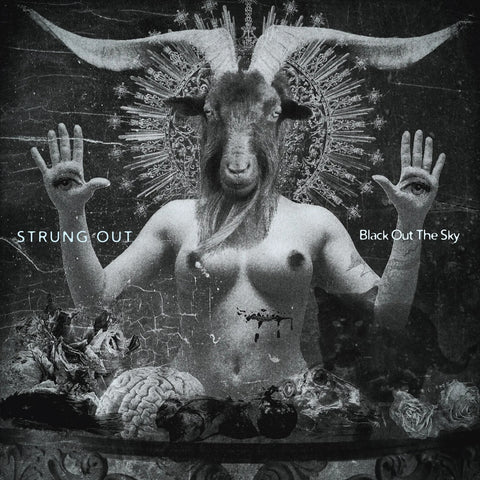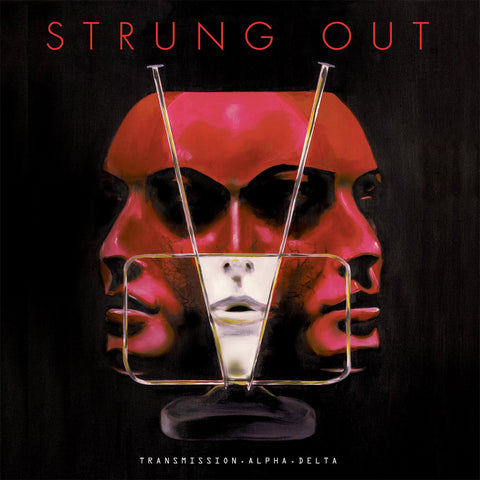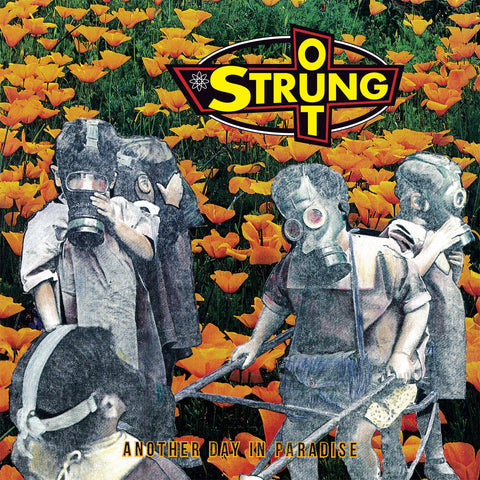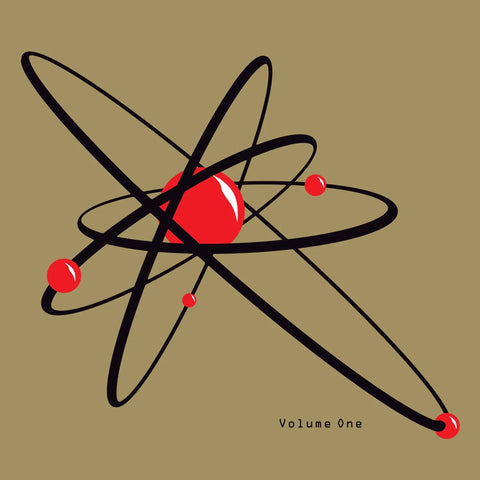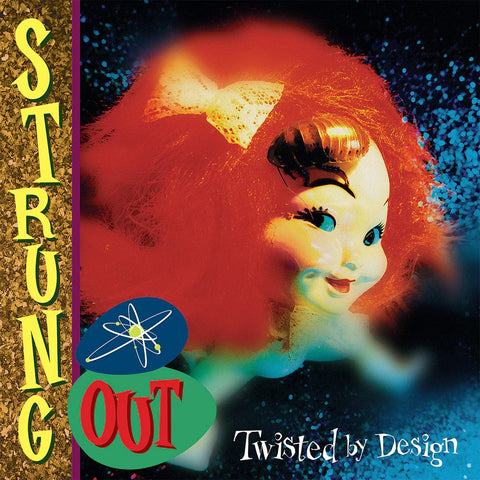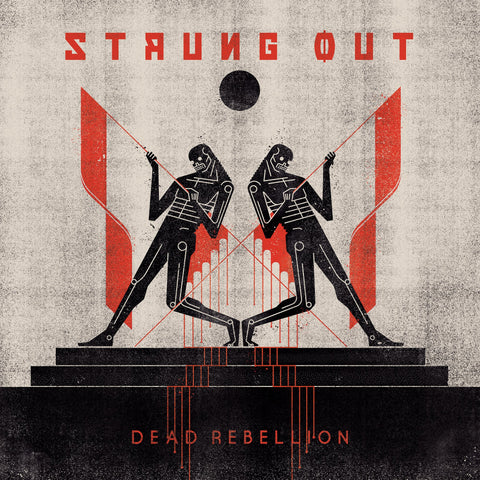
Strung Out
Photo by: Kevin Baldes
L-R: Chris Aiken, Rob Ramos, Daniel Blume, Derik Envy, Jason Cruz.
It was always going to be different. Regardless of what ended up happening between Strung Out’s previous record—2019’s Songs Of Armor And Devotion—and this new collection of songs, it was always the band’s intention to step away from themselves a little bit with it. Although Dead Rebellion—the band’s 10th album of their remarkable 35 year career—was written during the height of the pandemic and is, as all Strung Out albums have been, a reaction to the world at large and their own personal experiences within it, the band had already decided to end that chapter before Covid. A new beginning had long been in the works.
“We got to that point where I felt like if we kept going we’d be repeating ourselves,” explains vocalist Jason Cruz. “And you know, we’re a fucking metal band—a punk metal band—and there’s only so much you can do before people start writing you off as losing your roots or whatever. We all have side projects, so we use those to go into left-field, but I think that this is the most we can do and keep our fan base and actually take them in just a little bit of a slightly different direction. It’s more mid-tempo and more heavy, less worrying about speed. We were trying to be more melodic.”
That’s not to say these 12 songs don’t pack a punch, but, at the same time, the way the five-piece—these days completed by guitarists Rob Ramos and Chris Aiken, bassist Derik Envy and drummer Daniel Blume—focus on melody over riffs is definitely noticeable. Take, for instance, the way opener “Future Ghosts” begins in a frenzy of riffs and drumbeats before settling into a kind of hypnotic aggression, or how the frenetic undercurrent of “White Owls” quietens down, its power condensed into a hushed whisper before once again soaring off in an impassioned burst of emotion. Similarly, “Life You Bleed”—one of many requiems here for modern living—tiptoes quietly at first but then accelerates into a fully-fledged rock anthem.
Elsewhere, “Cages” is a vicious indictment of the fractious, polarized and technology-driven nature of society, while “Empire Down” is a self-reflective ode about living up to the pressures and expectations of being in this band. ‘We are the orphans of a revolution song,’ sings Cruz; elsewhere in the song, he quotes the chorus of the 1964 Nina Simone song, ‘Please Don’t Let Me Be Misunderstood’. When the album ends a few tracks later with the breakneck (yet still melodic) intensity of ‘Plastic Skeletons’, Cruz returns to the importance of that same revolution song. ‘Everybody dancing for applause,’ he sings, ‘when the song is how we rise above.’
“People always talk shit about religious people and spirituality,” says Cruz, “like ‘Oh, you believe in a man in the sky.’ But then the same people come up to me and look to me like I, or my songs, have the answers to their questions. Because everyone’s looking for something, everybody needs something. Sometimes, as a dad and as a husband, I wish I could call my dad or somebody and just ask ‘What the fuck do I do here?’ Everybody needs a Northern star. So while those two lines kind of contradict each other, at the same time they lend to each other that we’re all just looking for something and we all put our belief in something, no matter how ridiculous or superstitious it is. And those things can let you down, but they also can rise you up.”
Regardless of the pressure it may have put on the band, and despite Cruz’s insecurity that being a Northern star could let people down, Strung Out’s songs have been lifting people up for three-and-a-half decades now. Dead Rebellion is no different. In a world that Cruz sees as incredibly divided, one that—as he outlines on the afore-mentioned “Cages”—sees people constantly building what he calls “ideological walls” around each other, his hopes are this record can help tear them down.
“The key to this record,” says Cruz, “is technology and divisiveness—divisive language, divisive attitudes, divisive ideologies. I feel I was abandoned in a way, by a lot of things. What happened to bringing people together? I thought that that’s what we started doing this for. It’s still a huge part of who I am and it seeps into the lyrics - trying to just find some common ground with people again and remind people that we’re all the fucking same. At the end of the day, when the lights go out, we all want the same thing. And that’s where the title Dead Rebellion came from - like, we got so far and here we are right back again, just fragmented and at each other’s throats constantly.”
That, then, is the crux of Dead Rebellion. Produced, mixed and recorded by Shawn McGee at Artistry Recording Studio in Las Vegas, it might represent a new chapter for Strung Out, but it’s guided by the same principles that have always driven them. And while Cruz he says he’s never thought of Strung Out as political band, this record—like all Strung Out records—has captured the zeitgeist and the self-destructive political climate, especially in the USA, perfectly.
“I struggle with the political thing,” says Cruz. “I don’t think we’re political. I think we’re just human. We’re a bunch of guys who are like everybody else. We’re not that smart. We’re just five guys that had nothing in common and we’ve proved to the world that you can come together and make something beautiful if you put your bullshit aside. It’s as simple as that.”
Overtly political or otherwise, Dead Rebellion is nevertheless a record informed by and reacting to the world we live in, as well as all the experience and wisdom that Cruz has attained over the years. It’s also one built on the unwavering principles that the band have had at their core from the very beginning. So while Cruz hopes that it can help unify people, he’s more than aware that that’s very likely too much to ask. But that doesn’t mean he’s not going to try.
“I know that’s not going to happen,” he admits. “We’re too far gone. There’s a saying ‘You can never go back home’, and I feel like the horses are out the stable and they’re running wild. So this is my declaration of war, in a way—a war to stay true and to just go down like the person I know I am, to stay true to myself and to stay true to my brothers--and go down believing what I know is right, to look people in the eye and give them a chance, and to listen and to try my best to bring people together. And that’s the that’s the hill that I’m going to die on.”






